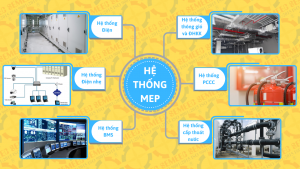1. What is M&E, MEP?
What is M&E? M&E stands for Mechanical and Electrical, which means Mechanical and Electrical. But because these two words do not describe the water supply and drainage system (Plumbing and Sanitary -P & S) and the fire prevention and fighting system (Fire alarm and Fighting), now people use the word MEP (Mechanical Electrical Plumbing) for full.
2. MEP / M & E systems are divided into 4 main categories:
Electrical System (Electrical System).
Water supply and drainage system and sanitary equipment (Plumbing & Sanitary, referred to as P&S).
Heating Ventilation Airconditioning (HVAC) system.
Lightning protection (Fire alarm & Fire fighting).
Before, when science was not yet developed, a construction project had only electricity, water supply and drainage system and simple communication system (telephone, television), so we called it the electricity-water system. only accounts for about 10-15% of the construction value. Nowadays, with the rapid development of technology, the project is equipped with many modern systems to increase comfort and efficiency during operation. Therefore, the MEP / M & E system is increasingly important, accounting for quite a large value from 45 – 65%, there are projects up to 70-80%.
3. What is MEP / M & E building system?
Electrical (Electrical) is the main energy source for the entire system of the project, including items related to Electricity: distribution, power supply; light; Controller and Light Electricity (Extra Low Voltage – ELV).

Heavy power includes:
Main power supply: is the main power supply system, including medium voltage cabinets, medium voltage lines, 24kV / 0.4kV transformers and main switchboards (called MSB, main switch board). There may be additional (Automatic Voltage Regulator System: Automatic Voltage Regulator System, referred to as AVR)
The system of distribution cabinets: Submain power supply (including power supply for power, manufacturing, lighting, socket …)
Living lighting system: Lighting
Socket system: Socket outlet
Incident lighting system: Emergency lighting (exit light, emergency light)
Earthing system (or grounding system)
Lightning protection system: Lightning protection system (including ground rods and lightning rod, other than grounding system)
Light power includes:
LAN and Internet systems: Data network system
Telephone system: Telephone system
Security monitoring system: Security & Supervisior system
PA system (public address system)….
Building management system (BMS) is a comprehensive system that allows for the control and management of all technical systems in the building such as electrical systems, domestic water supply systems, ventilation, environmental warnings. security, fire alarm – fire fighting, … to ensure the correct, timely, efficient operation of the equipment in the building, energy saving and operating costs. BMS system is a synchronous system with real-time, online, multimedia, multi-user, microprocessor system including the central microprocessor with all computer hardware and software. , I / O devices, area processors, sensors and control via point matrices.
The Mechanical (Mechanical) section in the building occupies a large amount of weight in the category of Ventilation and Air-conditioning (HVAC). The rest are items such as: Water supply and drainage and sanitary equipment (P&S); Fire alarm & Fire fighting system, Central GAS system, Elevator system …
In other words, MEP / M & E systems are the soul of a modern building. Create a premise for a stable operation of a project. Therefore, choosing the contractor to construct MEP / M & E system is a very important factor of the investor when investing in a modern project.
4. What is MEP / M & E Engineer?
What is an M&E engineer? It is the common name for engineers working in the building M&E categories. M&E engineer does not mean that this engineer has to master both parts M or E. Actually, part M or E are divided into different categories, each category will have professional engineers on it undertakes. However, they often call them M&E engineers because of the fact that the work that each engineer undertakes is usually related and coordinated by both M and E. It cannot be said that HVAC engineers only know the air-conditioner part. , and electrical engineers don’t care how the air conditioner works. Experienced and professional engineers, although they only specialize in Mechanical or Electrical, but their knowledge of M&E is good.
